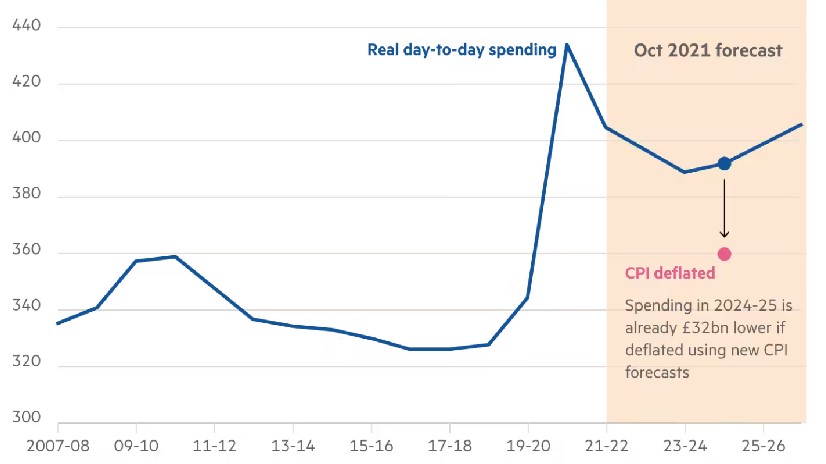‘Trussonomics’ was destroyed on Monday 17 October
New chancellor Jeremy Hunt in a statement to parliament on Monday 17 October, reversed all the major announcements in the mini budget made less than a month ago. It is a complete abandonment of all Liz Truss’s aims as Prime Minister and her chancellor Kwasi Kwarteng, and it effectively defenestrates the policy objectives of the government.
There will be no disruption; there will be no dash for growth; there will be no attack on orthodoxy. Instead, this is a hunt for stability, stability, stability led by new chancellor Jeremy Hunt.
Out is the 1p cut in the basic rate of income tax this year (pushed out to 2024 as previously planned but now in doubt), out is the rescinding of the corporation tax increase, out is the cut in the 45p rise, out is the cut to the dividend tax rate, out are the changes to IR35, out is the VAT cut for international travellers and out is the freezing of alcohol duties.
Even the energy price cap has been changed, with the scheme ending in April 2023 (lasting 6 months rather than 2 years), with more targeted, lower-cost support planned after that, so effectively limiting government spending on the scheme. The only proposals that have made it through are the reversal of the planned National Insurance increase, the widening stamp duty thresholds, and the abolition of the cap on bankers’ bonuses.

Funny enough, the markets did not seem as exercised about that latter policy change as they have some others – admittedly because it does not cost that much.
Bill Clinton’s former economic advisor, James Carville, said if he believed in reincarnation, he would like to return as the bond market because he would be able to intimidate everybody. Well, the bond market has undoubtedly scared the UK government into a screeching 180-degree change in economic policy.
The chancellor said that unfunded tax cuts were not the right thing to do and that more needed to be done to balance the public finances. He will now have to do whatever is required to bring down bond yields and reduce the risk of higher interest rates from the Bank of England.
The measures he announced came to about £32bn in tax rises, according to the Treasury (still no OBR judgment on the fiscal arithmetic). But that leaves him with about another £30bn to £40bn to achieve a balanced Budget, according to estimates from the Institute of Fiscal Studies (IFS) and the Resolution Foundation. Where these cuts are going to come from is hard to see. Department spending in real terms is already under pressure from rising inflation. Will there really be austerity mark 2?

Financial markets may well demand to see the colour of the Chancellor’s money, meaning he must announce the measures to buy their acceptance that fiscal prudence has been reasserted. That is a task for the 31 October spending review, which will be fully costed by the Office for Budget Responsibility, unlike Monday’s announcements. It seems that financial markets have calmed down, with bond yields pushing lower and the currency pushing somewhat higher, although still worse than pre-23rd September levels. Further tax rises and spending cuts may be required before that elusive stability is achieved. In short, some tough fiscal decisions still need to be made by the Chancellor. A hard winter and a difficult couple of years lie ahead for UK households and businesses. The real-world economic outcome of decisions made on 23rd September will be felt for many years.

The irony is not lost that the new administration, which was a fervent believer in the wisdom of markets, is now being forced into taking the sort of action which is inimical to their vision that to generate faster UK growth, all that was required was to let the market operate by cutting taxes and deregulating.
Financial markets do not believe the UK can embark on unfunded tax cuts to achieve faster economic growth. It may be possible for the US to announce unfunded tax cuts since the dollar is the global reserve currency, but it certainly isn’t for the UK to do so. It is running a large current account deficit and fiscal deficit and needs to borrow from international investors to fund these gaps.
It is unclear how the Prime Minister can survive this brutal policy reversal, so another leadership contest is possible in the near term. With hindsight, it’s clear that the mini budget on 23rd September was the shortest political suicide note in UK political history for a chancellor and possibly a PM. That said, the policies that the PM espoused to the small electorate that put her in office are the ones she implemented. To that extent, she is an example of a politician who did precisely what was promised once selected. That, too, is very ironic but dwarfed by its unwittingly unleashed consequences.

